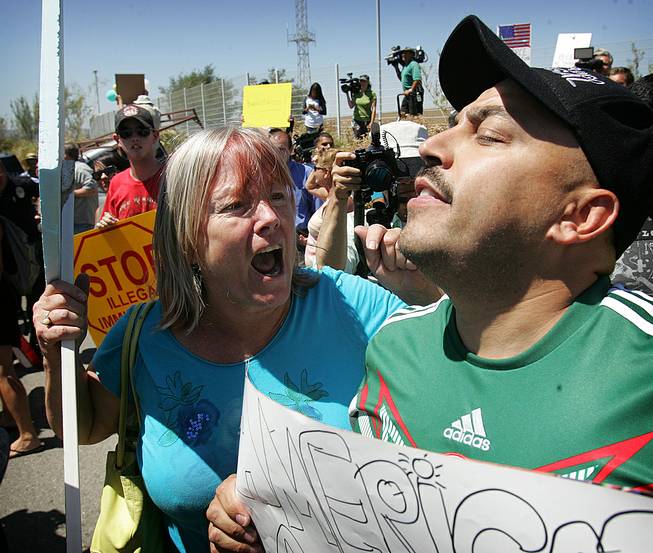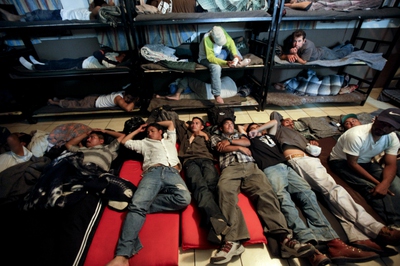
The Press-Enterprise / AP
An unidentified protester, left, argues with U.S. citizen Lupillo Rivera, brother of Mexican-American singer Jenni Rivera, as three buses carrying 140 immigrants attempt to enter the Murrieta U.S. Border Patrol station for processing Tuesday, July 1, 2014.
Monday, Feb. 8, 2016 | 2 a.m.

In this April 28, 2010, file photo, men look for a place to sleep in a crowded shelter for migrants deported from the United States in the border city of Nogales, Mexico. More Mexicans are leaving the United States than coming to the country, marking a reversal to one of the most significant immigration trends in U.S. history, according to a study published Thursday, Nov. 19, 2015.
REASON #1
Immigrants contribute an estimated $12 billion in taxes nationally.
Donald Trump would have you believe that Mexican immigrants, as a general rule, bring drugs and crime into the United States and are rapists.
And millions of Trump’s fellow citizens have no problem accepting that broad-brush characterization as fact: Sixteen percent of Americans think Mexican immigrants are “undesirables” — such as criminals — according to a Washington Post/ABC News poll.
Amid such sentiments, comments by Trump and those who echo him have fueled a volatile discussion about immigration policy nationally — a conversation that has proved particularly pressing in Nevada. Comments about immigrants and crime have struck a nerve among many in the Latino community here, the state with the highest share of undocumented immigrants in the country.
So what’s the reality? It’s not Trump’s characterization. Immigrants aren’t any more likely to commit crime than U.S. citizens, and they contribute billions of dollars each year to the national economy, studies show.
As the debate over immigration rages on, here’s more about the facts beyond the rhetoric.
First, some broad numbers for context.
REASON #2
If undocumented immigrants were given legal status, Nevada alone would see a $9 million increase in tax revenue.
Nevada’s immigrant population, documented and undocumented, has ballooned over the past couple of decades. In 1990, immigrants represented 9 percent of Nevada’s population. As of 2013, that share had more than doubled to 19 percent, or 529,164 immigrants, according to the Pew Research Center. Today, about 1 in 5 Nevadans was born outside of the country.
Nevada also boasts the highest share of undocumented immigrants of any state. Its 210,000 undocumented immigrants make up 8 percent of the state’s population, and more than two-thirds of them hail from Mexico.
It was only in the past decade, however, that Las Vegas emerged as a gateway city for immigrants, both documented and undocumented, UNLV professor John Tuman said. Las Vegas has a continual demand for labor in its hospitality, construction and retail industries — jobs that immigrants often and easily fill, he said.
In fact, immigration from Latin America fueled the demand for labor during the housing boom of the early 2000s, Tuman said. Immigration soared for a number of years until the Great Recession hit, residential construction crashed and immigration slowed. The number of undocumented immigrants in Nevada fell by 40,000 between 2008 and 2010.
“Nevada and Las Vegas were so hard hit with the emergence of the Great Recession,” Tuman said. “Residential construction came to a standstill, and the Latino unemployment rate increased. It was far higher than the rates for whites.”
• • •
Now, immigration — including unauthorized immigration — has picked up again along with the economic recovery, Tuman said. Immigrants, authorized and unauthorized, account for a substantial portion of the state’s workforce — about a quarter — with undocumented immigrants at about 10.2 percent.
Across the country, undocumented immigrants pay an estimated $12 billion in state and local taxes. In Nevada, they pay an estimated $94 million in sales and property taxes — a more moderate amount than other states because Nevada doesn’t have a state income tax.
REASON #3
In Nevada, they account for more than a quarter of the workforce. If they were to leave, the state would lose a significant amount of money.
A Brookings Mountain West study of Mexican-born immigrants in Nevada showed the primary reason for moving to the United States was to improve the immigrant’s economic situation. Other reasons include coming with parents, reuniting with family members and education.
“If undocumented immigrants were to leave Nevada, the state would lose a significant amount of money,” UNLV law professor Fatma Marouf said. “I don’t know if people realize what percentage of the population is foreign.”
Last fall, President Barack Obama announced a series of executive actions on immigration that expand the Deferred Action for Childhood Arrivals program — which allows undocumented immigrants brought into the United States as children two-year deportation deferrals and work permits — and create a similar program to defer action for parents of citizens and lawful permanent residents. However, the expansion of DACA and the creation of DAPA are temporarily on hold as the issue winds through the court system.
Experts say that the implementation of these programs could be an economic boon to the country. According to a study by the Institute on Taxation and Economic Policy, Nevada could see a $3 million increase in tax revenue if Obama’s executive action gets out of the courts, and a $9 million increase if all undocumented immigrants were to be given permanent legal residence.
Those numbers are smaller in Nevada because there is no state income tax. But in 2012, undocumented immigrants paid almost $12 billion in state and local taxes, and that number could increase by $845 million should the president’s executive actions go into effect.
“The deferred action program would be immensely beneficial to people who are sending their kids to school with our kids,” UNLV law professor Michael Kagan said. “By raising their immigration status, people will be able to significantly raise their income — and that would be beneficial to our economy.”
• • •
In recent years, the Department of Homeland Security’s Immigration and Customs Enforcement Office has shifted its priority to focus on deporting undocumented immigrants with criminal convictions, starting with the Secure Communities program in 2008. Current enforcement priorities, released in October by Secretary of Homeland Security Jeh Johnson, continue this trend, with Obama promising to deport “felons, not families.”
REASON #4
Studies show immigration leads to a decrease in crime.
“If you take the president at his word, you don’t want to see people with no criminal convictions subject to deportation,” Kagan said. “The administration has been working to bring that number down and bring the number of those with criminal convictions up.”
Although data show that the share of criminals in the population of deported individuals has increased over the past five years, experts attribute the increase not to increasing criminality of immigrants but to immigration enforcement priorities.
Experts say this has led to one major misperception about immigrants: that they increase the amount of crime in communities where they live.
Though local data on removals of undocumented immigrants with criminal convictions are not available, national data from 2013 show the biggest share of those removals, 32 percent, were for immigration offenses, including entry and re-entry, false claims to citizenship and alien smuggling. Dangerous drug offenses — which include the manufacturing, sale and possession of illegal drugs, including marijuana — and criminal traffic offenses such as hit-and-runs or driving under the influence accounted for 15 percent each.
Assault, burglary, weapons offenses and larceny accounted for 18 percent. Rape and homicide weren’t listed as separate categories, but lumped into the “other” category. All criminal offenses made up about 82 percent of removals inside the United States. Almost all noncriminals who were removed from the country were recent border crossers, repeat immigration violators or immigration court fugitives.
Even then, what might be pressed as a criminal charge for an undocumented immigrant might not even result in an arrest for a citizen. Two petty larceny offenses do not result in an arrest for a citizen — it’s a ticket, Kagan said. But it can make a person deportable if he or she is not a lawful resident.
Additionally, while citizens can try to show remorse, do community service or pay restitution in another way, immigrants are immediately deported and numbered among the criminals, Kagan said.
“There’s a clash between the criminal justice taken by our own local courts and legal system, representing a community where the crime takes place, and the federal government,” Kagan said.
The majority of studies have shown that immigration actually leads to a decrease in crime rather than an increase.
A recent report from the American Immigration Council shows that immigrants, documented and undocumented, are less likely to commit serious crimes and be behind bars than those born in the U.S. The study points to the fact that, though the share of immigrants in the U.S. population increased between 1990 and 2013, FBI data show violent crime rates and property crime rates fell by 48 percent and 41 percent, respectively.
Even the Center for Immigration Studies, a research organization that supports low immigration, reviewed all of the studies on crime and immigration and found “it would be a mistake to assume that immigrants as a group are more prone to crime than other groups, or that they should be viewed with more suspicion than others.”
“The reality is that undocumented immigrants are in the country to work and be with their families — and, in some cases, to flee from serious harm elsewhere,” Kagan said. “It’s a misnomer to think about them as criminals.”
Immigration attorney Roland Velasquez says the majority of his clients come to him after getting tangled up in deportation proceedings after an encounter with law enforcement. Some of his clients are surprised, not realizing that such encounters could put them on the track for deportation.
“The people who are most in shock are the ones who have DUI’s. For criminal purposes, it’s a violation,” Velasquez said. “But people don’t realize it still can become an enforcement priority.”
But some of his other clients find themselves entangled in deportation proceedings after having an application for a benefit, such as a green card, denied by the federal government.
Regardless of any criminal convictions, the easiest charge for the government to pursue is “entry without inspection,” Velasquez said.
“They say, ‘We think you came here without papers,’ ” Velasquez said. “And then they have to prove they have papers.”
• • •
For immigrants, it’s not always clear whether someone is eligible for citizenship or, if they are undocumented, what kind of relief for which they might be eligible.
For instance, those eligible for citizenship often think they will have to give up their homes in Mexico or that they have to wait until they turn 65 to take the citizenship test, said Astrid Silva, organizing director of the Progressive Leadership Alliance of Nevada. That’s why the organization helps host citizenship workshops.
“People say, ‘Oh, I can’t pass the English exam. How long is the essay?’ ” Silva said. “People are under the false impression that you have to recite a Shakespeare play or something.”
The organization also is working to help undocumented immigrants receive various forms of relief from the government, like applying for DACA status or a U-visa, relief for victims of crime in the United States.
“It’s crazy how many people are eligible for DACA and DAPA and don’t know it,” Silva said.
Last session, the Nevada Legislature passed several immigration-reform bills, including one that makes it easier for immigrants with temporary legal status to get teaching licenses.
For now, supporters of immigration reform in Las Vegas have their sights set on the national stage, registering voters for the February caucuses in Nevada and pressing presidential candidates to talk about immigration, PLAN communications director Laura Martin said.
“People come here wanting a better life. They’re in love. They want to strengthen their family. It’s not anything nefarious like our friend Donald Trump says,” Martin said. “It doesn’t matter who you support, but you have to pay attention to what people are saying. I think maybe the only thing worse than not voting at all is not doing your homework.”


Join the Discussion:
Check this out for a full explanation of our conversion to the LiveFyre commenting system and instructions on how to sign up for an account.
Full comments policy